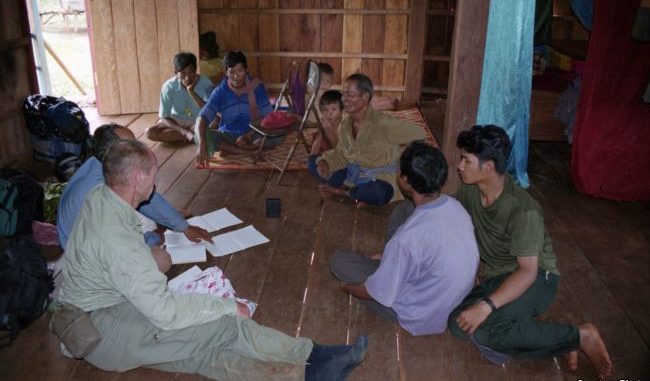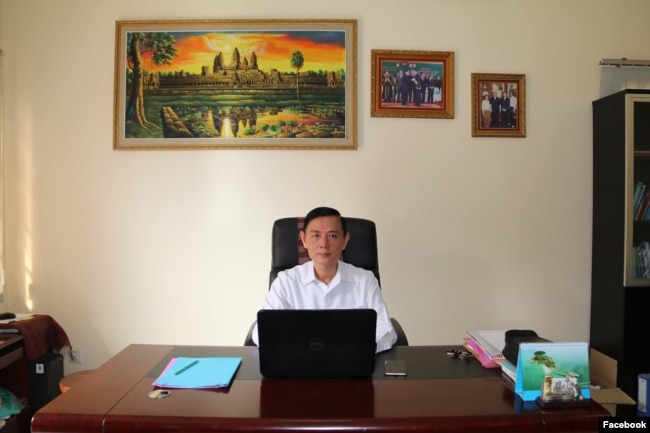
WASHINGTON — Sylvain Vogel, a native of France, grew up in Alsace-Lorraine speaking French and German. Since then, he’s acquired fluency in English, Portuguese, Farsi, Pashto and Khmer, the language spoken by the majority of people in his adopted country, Cambodia.
Vogel has spent most of the past 25 years studying, researching and teaching, and helping anchor the fledgling rebirth of a culture of scholarship in this Southeast Asian country following the repressive and anti-intellectual Khmer Rouge rule of the 1970s.
A professor at the Royal University of Fine Arts, he teaches — no surprise — linguistics and Sanskrit, which is closely related to Khmer.
Passion project
Outside the classroom, he has pursued a passion project — documenting Bunong — since the mid-1990s. A largely unwritten language, it is spoken by members of the Bunong ethnic group, who live in Cambodia’s sparsely populated Mondulkiri province, a place of mystical beauty under threat from modernization and encroachment by the Khmer population and foreign investment.
Earlier this year, Vogel’s scholarship and independent research received a boost when it was recognized by the Fainting Robin Foundation. The U.S. organization supports independent scholars and announced in March that Vogel would be the first recipient of its “distinguished scholar” award.
Most of Vogel’s research over the years about the Bunong language and people was carried out at his own expense, said Peter Maguire, chairman of the Fainting Robin Foundation.
“It was a project that took close to 20 years, with no outside support, with no support or minimal support,” said Maguire, an author and historian who set up the foundation in Wilmington, North Carolina.
“He [Vogel] is a resource that is very important to Cambodia,’’ said Chan Somnoble, one of Vogel’s first Cambodian students, who earned a Ph.D. in linguistics in 2002 from Université Paris Nanterre and is now the deputy director of the Royal Academy of Cambodia and head of the prestigious National Council for Khmer Language.
First meeting, fluency
Vogel first met members of the indigenous Bunong community in 1994. He became intrigued by the unwritten language and the Bunong’s rich folklore, which was passed orally from generation to generation.
“I knew Bunong is in the family of Mon-Khmer languages,’’ Vogel told VOA Khmer. “As a linguist, I had to learn Bunong to compare Khmer and Bunong.’’
So, Vogel being Vogel, did just that. He gradually immersed himself in the Bunong community and its distinct way of life, staying in remote villages for days and then weeks at a time.
Fluency in yet another language came as he deepened his relationship with the Bunong, and over the years, Vogel found their way of living among the rolling, jungle hills changing.
A governing system centered on village chiefs and local elders gave way to administrative officers and provincial officials. Bunong children were encouraged to attend schools where they spoke in Khmer, learned about computers and studied English.
What losing a language means
Vogel voiced his concerns over the potential loss of the Bunong language and traditions.
“Bunong language is not used much, the society is changing a lot, so I am afraid that Bunong language will disappear,” Vogel said.
Becky Butler of the University of North Carolina at Chapel Hill, who wrote her dissertation while at Cornell University on Bunong, agrees with Vogel’s assessment.
“The Ethnologue says it’s developing. UNESCO says it’s severely endangered,” Butler told VOA Khmer. “So I’d put it probably at vulnerable.” She estimates there are about 75,000 Bunong speakers in Cambodia, Vietnam and the United States.
Vogel’s first book about the language translated Bunong grammar into the international phonetic alphabet. It was published in 2006 in French. Vogel has written two other books about the grammar and aspects of oral literature, such as epics, songs and chants, and one book about Bunong culture.
“I think that is tremendously important … because he’s recording the sort of oral tradition, which speaks a lot to who people in the community are and what they believe in their history, and how they see themselves in another perspective on life that might otherwise be lost especially as the older generations pass away,” Butler said.
Yun Lorang is a native Bunong and he also worries that his language is deteriorating.
“I am quite worried because language is related to identity,” Lorang, secretariat coordinator of Cambodia Indigenous People Alliance, told VOA Khmer. “In a crowd, they [Bunong people] rarely speak Bunong, they speak Khmer.”
Lorang thinks that having the Bunong language and culture documented in a written and published form can help prevent it from disappearing.
“History is very important for us to recover our own spirit, values and identities,” said Lorang, who lives in Sen Monorom town, the capital of Mondulkiri province.
“The idea of any language dying, I think is tragic,” Butler said. “Language is so intensively tied to who we are. People say that it determines how we see the world.
“I think we all lose something, some knowledge about the human conditions, some knowledge about why people think the way they do, and we lose some aspects of, I think, beauty in the world.”
A rare level of commitment
Maguire has known Vogel for years and spent some time with him in Mondulkiri province. He praised Vogel’s dedication to studying Bunong, a language that has received little attention from established researchers and academic institutions, Cambodian or international.
Vogel also teaches his Cambodian students Sanskrit and general linguistics rather than French because of historical ties between Khmer and the ancient language.
Vogel said not many Cambodian students wanted to study Sanskrit but that “even one” was enough “because more Sanskrit inscriptions may be discovered in the future’’ in Cambodia, he said. “If there are Khmer experts on Sanskrit, they can work with international researchers to translate Sanskrit inscriptions which belong to Cambodia.”
Vogel’s work as a Sanskrit and linguistics professor, whose instruction helped nurture respected Cambodian scholars such as Somnoble, is another reason the foundation recognized him, Maguire said.
“As long as I knew him, he taught linguistics five days a week, and he taught in Khmer,’’ Maguire said. “He didn’t teach in English. He didn’t teach in French. He made a huge effort to learn the language, to learn it well, to learn it grammatically correct, and to learn how to read it and write it. That’s a level of commitment very few scholars have.’’
VOA

